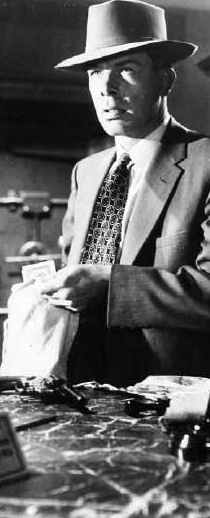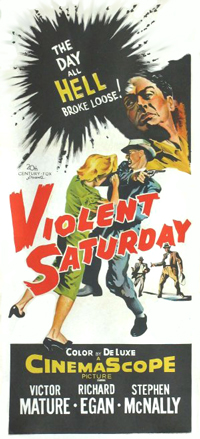
 |
|
|
|
An influential film book from back in 1971 was art critic Lawrence Alloway's Violent America: The Movies 1946-1964, based on a film screening series that took place at the Museum of Modern Art. Alloway discussed the thrillers of this period as exemplars of a concept called Covert Culture: "There seems to be a greater interest in violence in the mass audience than is tolerable to the elite critics of society." That translates as saying that critics looking for spiritual enlightenment were baffled by the violent fantasies down at the Bijou. The New York Times' Bosley Crowther frequently held the attitude that violent movie fare was an insult directed at him personally. He described the film reviewed here as "guarded pornography." And all because a sadistic hood grinds a little kid's hand into the sidewalk. An excellent example of a popular film undermining America's artistic values is Fox's CinemaScope release from 1955, Violent Saturday. Although now promoted as a film noir -- apparently every movie with someone in street clothes carrying a gun now qualifies -- Violent Saturday is a dramatic hybrid. John Sturges' Bad Day at Black Rock from the same year is a socially conscious exposé of a racial hate crime -- but with a little ju-jitsu and gunplay to keep the rubes in their seats. Violent Saturday grafts a brutal caper story onto the basic Grand Hotel converging plotlines template: substitute a volcano or an earthquake for the bank robbery, and we'd have a generic Disaster Movie. Producer Buddy Adler spun a number of golden hits for Fox at this time, spread across several genres. For Violent Saturday he gathered key noir talent in the persons of scriptwriter Sydney Boehm (The Big Heat) and director Richard Fleischer (The Narrow Margin). The movie is certainly violent enough, but its thematic agenda falls more in the 'threat to the family' subgenre that in the 1950s seemed always to reinforce conformist social ideas. 
The desert mining town of Bradenville could easily be renamed "Peyton Place Gulch". Alcoholic mine owner Boyd Fairchild (Richard Egan) is so distraught that his wife Emily (Margaret Hayes) is running around with golf Romeo Gil Clayton (Brad Dexter) that he picks up local nurse Linda Sherman (Virginia Leith). Linda in turn is the voyeuristic object of desire for Harry Reeves (Tommy Noonan), the manager of the local bank. Librarian Elsie Braden (Sylvia Sydney) catches Harry in the act, but they share guilty secrets when he learns that she's turned to thievery to pay her mortgage. And happily married mine foreman Shelley Martin (Victor Mature) discovers why his ten year-old son Steve (Billy Chapin) is so ashamed of him: Shelley stayed on the job during the war while a neighbor kid's father was earning medals in combat. Breezing into town come thieves Harper, Chapman and Dill (Stephen McNally, J. Carrol Naish and Lee Marvin). Their plan to rob Harry's bank at closing time on Saturday makes use of a local farm run by the Amish Stadt (Ernest Borgnine). The crooks are counting on the religious family to offer no resistance -- they're averse to violence in any form. Violent Saturday is sharp, efficient and thoroughly modern for 1955, thanks to Richard Fleischer's assured direction. Some critics claimed that Fleischer was an example of a good director stifled by the requirements of CinemaScope. We see little compromise at work, as Fleisher composes in depth and uses the wide screen as well as cutting to introduce new visual elements. It is true that the early 'scope lenses just didn't deal well with confined spaces, which means that even cramped settings like the local diner look unusually spacious. While the crooks case the town the film presents an interesting vision of a new Wild West. The glory of American industry is an enormous open-pit copper mine. Giant dump trucks seem to be "erasing" the landscape and shipping if off in train cars. Shelley Martin's handsome house has a 180° view of nothing but destroyed scenery. In this landscape it only makes sense that the good citizens of Bradenville should be a collection of selfish, rapacious desires. Emily Fairchild strays out of boredom, but she also seems to be rebelling against something. Linda Sherman looks demure and innocent but would be perfectly happy to see Boyd leave his wife. Linda doesn't even seem to mind Harry's Peeping Tomfoolery all that much. Most telling is young Steve Martin (!) who smashes things around the house and gets into fights with his best friend, all because his dad wasn't a killer in the Big War. A boy needs a role model, right? Stevie is yet another screwed up '50s kid reacting to an anxiety-filled period of peace and prosperity, like little Tommy Forbes in Andre de Toth's Pitfall and David MacLean in William Cameron Menzies' Invaders from Mars. The fun in Violent Saturday is anticipating the town's eruption into chaos. The filmmakers stage all manner of aggressive behavior, with the pill-popping Dill operating on a hair trigger and the cool cucumber Chapman acting with quiet menace. After playing seemingly dozens of low-life creeps in pre-Code crime pictures, oldster J. Carroll Naish is an excellent choice as a bespectacled crook. New blood Lee Marvin adds a 'method' gimmick of a nasal inhaler to his collection of tics. Both men direct their hostility at children playing on the street and talking back during the robbery. Under the '50s code of Proper Family Conduct, these hoods are begging to receive a vigilante backlash. The final showdown at Amish Acres shapes up as the philosophical opposite of Jessamyn West's Friendly Persuasion: Ernest Borgnine's principled paterfamilias looks on while the desperate Shelley Martin is forced to resist the murderous bandits on his own. The Amish have silently obeyed the bandits' orders, a choice that leaves a row of little Amish children bound and gagged, as helpless as victims of the Nazis. Will Papa Pacifist find it necessary to abandon his righteous code and take up a weapon? Violent Saturday confects a situation to force the plowshare-sword issue in a hawkish direction. 1 
Violent Saturday knows that it's finished when the bloody battle is resolved; we get a moment to mourn a victim of the shooting but don't find out what really becomes of the poor, bitter librarian played by Sylvia Sydney. A still exists of Sydney from what might be a deleted scene. She's talking to a man who could be a problem husband, and the reason why she is short of funds. Just twenty years before the actress had been the personification of social injustice in American films like You Only Live Once, and as late as 1996 the indomitable actress was still appearing in Tim Burton films. Now that's real staying power. Violent Saturday ends on what should be a disturbing note: little Stevie Martin learns that he was right all along: a man who kills is a real man. Peaceful 1955 America is still a warring nation. Standout Virginia Leith made a number of interesting films but never caught the brass ring; she's unfortunately best known for her knockout performance (really) as a telepathic disembodied head in The Brain That Wouldn't Die. Twilight Time's DVD of Violent Saturday is a colorful widescreen transfer of this early CinemaScope hit. It's unfortunately encoded flat-letterboxed, the only video source available to Twilight Time. It looks reasonable on a normal flat monitor, but shows minor flaws and becomes soft when enlarged to fit larger video displays. The clear soundtrack showcases Hugo Friedhofer's emphatic score, which can also be audited on a separate music-only track. Julie Kirgo contributes informative liner notes to the color insert pamphlet. Twilight Time can be commended this time for the arresting graphic treatment seen on its box art, with a moment of (what else?) personal violence frozen in a Vanishing Point-- like zoom effect. The Twilight Time discs are sold exclusively through the Screen Archives Entertainment site, and the Violent Saturday disc run is set at 3,000. Julie Kirgo identifies the filming location as Bisbee, Arizona. Gee, if we take the name of the town as Bisbee and not "Bradenville", then Violent Saturday connects right up to the movie version of L.A. Confidential. Kim Basinger's character Lynn Bracken in Confidential exits with her battered cop boyfriend to go back and live in Bisbee, where "the girls need glamour too." So maybe Lynn Bracken was there at the big bank robbery as well.
On a scale of Excellent, Good, Fair, and Poor,
Violent Saturday rates:
Footnote:
1. The film's view of the Amish farmer's "irrational" pacifism distorts the issue to make a pro-war statement. All good Christians are against violence, yes, and the Quakers and Amish are vocal about their right to not fight -- in WARS. Threaten an Amish farmer's children, or for that matter look sideways at his daughter, and don't expect a passive reaction. Violent Saturday keeps returning to the 1950s equation: Prosperity = fighting for freedom. The underlying message is that the robbers represent the ever-present menace against which we must be forever vigilant: "Hey you slacker ingrate, the only reason you can enjoy that ice cream cone in peace is because thousands of real Americans died to keep you free!"
Reviews on the Savant main site have additional credits information and are often updated and annotated with reader input and graphics. Also, don't forget the 2010 Savant Wish List. T'was Ever Thus.
Review Staff | About DVD Talk | Newsletter Subscribe | Join DVD Talk Forum |
| ||||||||||||||||||